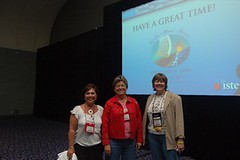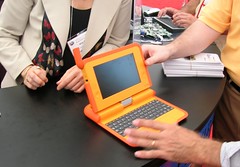I've spent a good deal of time in unfamiliar territory ... "Terminal" land. The quest began earlier today when several teachers in the lab were in search of a calendar template for their classroom planning. We have several "calendar" tools on hand: iCal, Now Up-to-Date, Palm, and Entourage. Each of these are great calendar programs in their own right. And, all seem to require creating and defining "events" which then become listed in the corresponding dates of the calendar.
In the past, teachers have used the nifty "Calendar Assistant" in AppleWorks which creates an AppleWorks Drawing document containing a table with the dates of the specific Month and Year entered when stepping through the assistant. Once the assistant has created the document, in a few clicks, you can change the page set-up to landscape, and drag the corner of the table to fill the page. Text and graphics are easily added by typing in the "dated" cells and inserting clip art from the clippings menu. When finished, the file can be printed to paper, or pdf, or saved as a .jpg file which is suitable for posting to the web (See
http://www6.district125.k12.il.us/staffdev/train.html for the summer calendar). Alas, we are standardizing on the "Office" apps and moving away from AppleWorks, since it is being phased out by Apple. I will dearly miss this simple, and elegant application!
So, after a quick review of the templates included with Office, and not finding any calendars, we searched the Microsoft website and located the "
Calendars, Labels, Planners, and Stationery" link. The selection looked promising, as there were several "2006-07 academic year" calendar templates among the 28 templates available in the "2007 Calendars" category. The templates are provided for a variety of Microsoft file formats; Visio and Publisher (PC-only), and Word, Excel and PowerPoint.
After locating several that looked good, I clicked the "Download" button only to end up on a page that stated
"Your operating system does not meet system requirements. This template could not be downloaded automatically because your operating system does not meet the requirements for downloading Office Online templates." (The files are compressed in the .CAB format, which is not supported on Macintosh.) At the bottom of the page however states, "If you are using a Macintosh operating system, you can find templates at
Mactopia Tools on the Web." Ok, so off to Mactopia Tools where we found 437 templates available, but not ONE calendar file for teachers or students (there was one meal planner calendar, but that was it).
So, returning to the "
Calendars, Labels, Planners, and Stationery" link, I proceeding to download several of the .cab files. A Google search of "extract CAB files on Macintosh" led me to
FileJuicer a program that could decompress the .cab files and also provides several other helpful conversion and extraction tools. FileJuicer is a shareware program, and for $12, seems like a good basic "tool" to own.
Further "Googling" pointed me to an open source (="free") file named "
cabextract" that would run as a package for
Fink. (The Fink project is an effort to port popular Unix programs to Mac OS X).
So, I proceeded to download and install Fink, and Fink Commander (GUI menu interface) to be able to use cabextract. This is where the scary part comes in. I have used the Terminal application in a few instances, but I am not a UNIX geek by any means, so I basically crossed my fingers and clicked through a series of prompts and was able to get cabextract installed. (I am not sure it's in the best place, but it is working).
In the end, I was able to open Terminal and enter the commands (as listed in the "--help" page) to extract the .cab files into their Word, PowerPoint and Excel templates, which I have re-saved as non-template Office files.
May I whine?! H-E-L-L-O! I think that Microsoft could at least provide these Office templates in a format that can be read and used by Macintosh users. All in all, I suppose that since I learned a little more about UNIX commands and using Terminal, it was worth the time and effort -- and now I have some calendar samples to share with everyone!
 Created by teacher-librarian Debbie Abilock and her son, Damon, NoodleTools provides subscription-based services for schools, although many resources are available on their public website. Send your students to Information Literacy: Search Strategies or NoodleQuest to help them gather resources for their academic research. NoodleQuest is a "Search Strategy Wizard" containing a short form of 9 questions to help students get started.
Created by teacher-librarian Debbie Abilock and her son, Damon, NoodleTools provides subscription-based services for schools, although many resources are available on their public website. Send your students to Information Literacy: Search Strategies or NoodleQuest to help them gather resources for their academic research. NoodleQuest is a "Search Strategy Wizard" containing a short form of 9 questions to help students get started.
